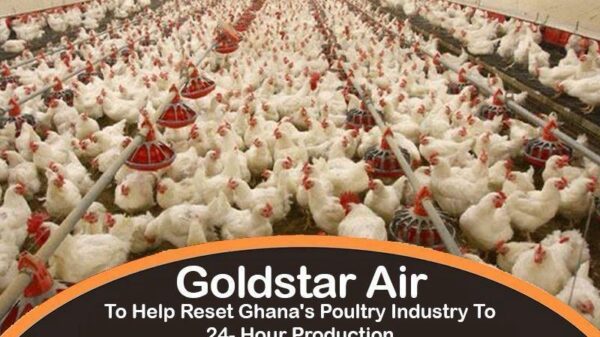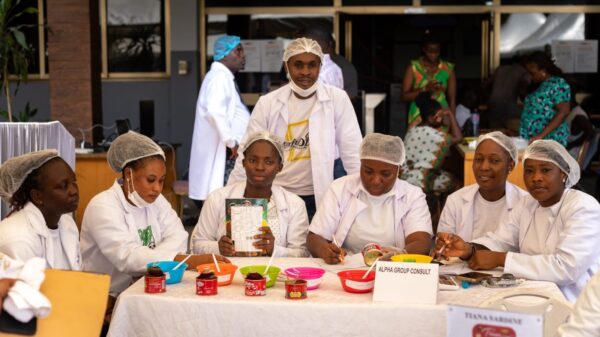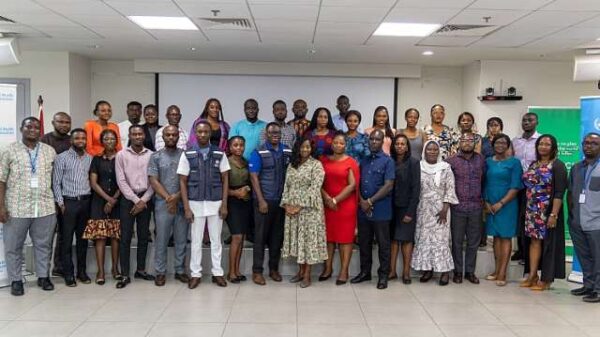 Private international airline Goldstar Air, Ghanaian and United States registered company with an issued Air Carrier License (ACL/N-SCH No. 0239) from the Ghana Civil Aviation Authority (GCAA) to operate passenger and cargo flights across West Africa and Intercontinental routes, seeks to reset Ghana’s poultry industry (Nkoko Nkitinkiti) by introducing efficient logistics, investing in modern poultry farming techniques, and integrating advanced technologies. This will ensure a 24-hour production system and a competitive sector that meets both local and international demands and on course with the airline’s Project $1 Trillion foreign reserves initiative.
Private international airline Goldstar Air, Ghanaian and United States registered company with an issued Air Carrier License (ACL/N-SCH No. 0239) from the Ghana Civil Aviation Authority (GCAA) to operate passenger and cargo flights across West Africa and Intercontinental routes, seeks to reset Ghana’s poultry industry (Nkoko Nkitinkiti) by introducing efficient logistics, investing in modern poultry farming techniques, and integrating advanced technologies. This will ensure a 24-hour production system and a competitive sector that meets both local and international demands and on course with the airline’s Project $1 Trillion foreign reserves initiative.
Goldstar Air is going to seek international intervention to look into the airline’s Safety Certificate (AOC), as the process is above halfway and it has been over eight years that the Ghana Civil Aviation Authority is not ready to get a qualified third-party to complete the remaining phases of the certification process, for which an administrative fee will be charged to Goldstar Air to pay and the airline is ready to pay. There is no time to waste in starting the 24-hour economy to create over two million direct and indirect job opportunities for Ghanaians. The Ghanaian youth cannot wait any longer in the ghettos; they need their well-paying jobs.
The airline is poised to play a transformative role in revitalizing Ghana’s poultry industry by supporting a shift to a 24-hour production model. Poultry plays a significant role in global meals, and in Ghana, the poultry sector has long been a vital part of the agricultural economy, providing employment, enhancing food security, supporting local businesses, and serving as a potential export product capable of earning significant foreign exchange. However, challenges such as high feed costs, inadequate infrastructure, inconsistent supply chains, and limited access to international markets have stifled growth. These issues can be resolved through the establishment of intensive industrial farms with agricultural processing facilities.
Goldstar Air will support farmers in focusing on value chain development in industrial poultry, a sector where Ghana has the potential to reduce imports and enhance 24-hour local production, as part of the airline’s $1 Trillion foreign reserves project. Ghana should not import certain products when it has the resources to produce them locally, 24/7.
The global food service market reached $2.52 Trillion in 2021 and is projected to grow to $4.43 Trillion by 2028, reflecting a compound annual growth rate (CAGR) of 9.9% from 2021 to 2028. Therefore, Ghana has to tap into this income stream to enhance the cedi’s stability and support the accumulation of foreign exchange reserves.
Resetting Ghana’s poultry industry to a 24-hour production model will require strong partnerships between stakeholders. Goldstar Air will collaborate with government agencies, industry associations, research institutions, and international organizations to create an enabling environment for poultry farmers. These partnerships will focus on policy development, research investment, and the implementation of best practices to drive growth in the sector.
Local farmers struggle with high costs of production, particularly feed, which constitutes a major expense. The industry’s dependence on imported maize and soybeans has exposed it to price fluctuations, making profitability difficult. Goldstar Air’s intervention will involve creating streamlined channels for sourcing essential poultry feed ingredients, while also promoting local production of high-quality feed. By ensuring a consistent and affordable feed supply, poultry farmers can maintain continuous production cycles, reduce dependency on imports, and increase profitability and efficiency.
Goldstar Air’s initiative aims to reset Ghana’s poultry industry by boosting domestic production and improving local processing capacity for the airline’s in-flight meals, local consumption, and export. By making locally produced poultry more accessible and affordable, the industry will be able to compete effectively with imported alternatives, ensuring food security and economic resilience. The airline will also empower farmers with access to modern farming equipment, poultry housing, and automated feeding systems.
Ghana consumes approximately 300,000 metric tonnes of imported poultry meat annually. Only 5% is produced locally, while 95% is imported from the Netherlands, Brazil, Poland, Belgium, the USA, and other markets, at a value of nearly $400 million. According to the Ghana National Association of Poultry Farmers (GNAPF), there has been little investment in the poultry value chain, from hatcheries, feed mills, and processing facilities to cold chain logistics. Without quick action, the value of imports will continue to rise, depleting Ghana’s foreign reserves.
According to Ghana National Association of Poultry Farmers, in-country production facilities are inadequate. Local hatcheries meet only 5% of the 300,000 mt capacity, whilst the poultry feed milling capacity is at 12%. There exists only one commercial poultry abattoir in Ghana, which slaughters 9,000 birds per day. The largest commercial chicken farm in the country has a capacity of 500,000 birds. Despite these challenges, there are strong opportunities for investors interested in the sector.
Broiler production in Ghana is low: only 15% is produced locally, with 85% imported. The Ghanaian government has recently launched the Feed Ghana program to support national poultry demand. The program aims to encourage investment across the poultry value chain. Goldstar Air will collaborate with other stakeholders in the realization of this vision by facilitating consistent maize and soybean supply for the organic industrial farms, thereby helping to produce organic poultry birds. These two crops are critical for in-country poultry feed production, and any shortage leads to increased costs, making local broilers less competitive compared to cheaper imports.
According to the Chairman and Chief Executive Officer of Goldstar Air, the airline will collaborate with other stakeholders to establish large-scale industrial farms that will include slaughtering, poultry meat processing, haulage, cold storage facilities, existing hatcheries, feed mills, and breeder farms. These will augment both existing capacities and Goldstar Air’s in-flight meals. Though Ghana’s local poultry industry is overshadowed by foreign imports, there are opportunities for investors willing to capture a share of the $400 million market with the right partnerships and technologies.
One of the major limitations of Ghana’s poultry industry is inadequate cold chain infrastructure. Many small- and medium-scale poultry farms lack the necessary refrigeration and storage facilities to keep poultry products fresh, leading to post-production losses. Goldstar Air’s industrial cold storage facilities will help store poultry products for local consumption and export. The airline’s cargo services will facilitate efficient transportation of poultry products across Ghana and beyond, ensuring that fresh and frozen poultry reach domestic and international markets in optimal condition. The airline’s investment in modern cold chain logistics will address bottlenecks in poultry distribution, enabling uninterrupted production cycles and increasing the industry’s capacity to meet demand.
Expanding Ghana’s poultry industry will also require access to international markets to create new revenue streams. Goldstar Air’s extensive network will provide Ghanaian poultry farmers with direct links to global markets, enabling them to export high-quality poultry products to countries in Africa, Europe, and the Middle East. This access will boost the industry competitiveness, attract foreign investment, and encourage farmers to scale up production. The airline’s ability to transport fresh poultry products quickly and efficiently will be a game-changer in positioning Ghana as a leading poultry exporter under the airline’s Project $1 Trillion Foreign Reserves initiative.
Goldstar Air will support the implementation of smart poultry farming techniques, including automated climate control systems, precision feeding technologies, and real-time monitoring of flock health. These innovations will ensure that poultry farms operate efficiently around the clock, reducing waste and increasing productivity. The integration of digital platforms for record-keeping, supply chain management, and sales tracking will also enhance transparency and efficiency across the airline’s industrial poultry farms.
Training and capacity building are critical to ensuring that Ghana’s poultry industry thrives under Goldstar Air’s 24-hour production model. Many farmers lack knowledge of best practices in poultry farming, disease prevention, and biosecurity measures. Goldstar Air will establish training programs in collaboration with agricultural institutions to educate farmers on sustainable 24-hour poultry production. These programs will cover topics such as breeding techniques, hatchery management, disease control, and efficient resource utilization. By equipping farmers with the necessary skills for modern poultry farming, the industry will experience improved productivity and long-term sustainability.
Goldstar Air’s commitment to resetting Ghana’s poultry industry includes improving biosecurity measures to prevent the outbreak of poultry diseases. Avian influenza and other poultry-related diseases have posed significant threats to Ghana’s poultry sector, leading to farm closures and financial losses. The airline will work with veterinary experts and government agencies to implement strict biosecurity protocols at poultry farms and processing facilities. Measures such as regular health screenings, vaccination programs, and controlled farm access will reduce disease outbreaks, ensuring continuous production, and safeguarding the livelihoods of farmers.
Environmental sustainability is another key aspect of transforming Ghana’s poultry industry into a 24-hour production model. Goldstar Air will promote sustainable farming practices that minimize waste and reduce environmental impact. The use of renewable energy sources such as solar power for poultry houses, efficient waste management systems, and water conservation techniques will be encouraged to ensure the industry operates in an environmentally responsible manner. By adopting sustainable practices, Ghana’s poultry sector can achieve long-term growth while preserving natural resources.
Employment generation is one of the major benefits of expanding Ghana’s poultry industry to a 24-hour production cycle. Increased production capacity will create new jobs in poultry farming, processing, logistics, and distribution. Goldstar Air’s initiative will not only provide employment opportunities for farmers but also generate jobs in ancillary industries such as feed production, equipment manufacturing, and retail. By stimulating economic activity in both rural and urban areas, the airline’s intervention will contribute to poverty reduction and improved living standards for many Ghanaians.
Goldstar Air will also advocate for investments in alternative energy solutions such as solar power and biogas systems to ensure uninterrupted operations. By utilizing these energy systems, the airline’s industrial farms will reduce dependency on the national grid, maintaining 24-hour production without the risk of power disruptions affecting the facilities.
The airline will support initiatives that enhance the nutritional quality of poultry products. With consumers becoming increasingly conscious of food safety and quality, it is essential for Ghanaian poultry producers to meet international standards. The airline will work with regulatory bodies to promote high-quality poultry production, ensuring that products are free from harmful additives and contaminants. This will boost consumer confidence and increase demand for locally produced poultry.
Goldstar Air’s efforts to reset Ghana’s poultry industry will also positively impact school feeding programs and community nutrition initiatives. Increased local poultry production will make protein-rich foods more accessible to schoolchildren and vulnerable populations. By ensuring poultry is readily available at affordable prices, the airline will help improve nutrition and health outcomes across the country.
The role of women in Ghana’s poultry industry cannot be overlooked. Many women are actively involved in poultry farming, processing, and sales, yet they often face barriers to growth. Goldstar Air will introduce empowerment programs to support women in poultry farming by providing business training and access to modern farming technologies. By promoting gender inclusivity, the airline will help women entrepreneurs thrive in the poultry industry and contribute to overall economic development.
Mr. Bannerman emphasized that the airline’s commitment to transforming Ghana’s poultry industry into a 24-hour production model is a groundbreaking initiative that will enhance food security, create employment, and boost the country’s economy. Through strategic investments in transportation, infrastructure, technology, training, and sustainability, Goldstar Air will play a pivotal role in reshaping Ghana’s poultry sector. This initiative will benefit not only farmers but also consumers, businesses, and the economy at large, making Ghana’s poultry industry more resilient, competitive, and sustainable.
Agriculture is the backbone of every economy, creating jobs and funding schools, roads, hospitals, and public services. Even if you live in the city, agriculture affects you in ways you might not realize. The food you buy, the gas you pump, the clothes you wear, they all connect back to farming.
According to the United Nations, the global agriculture sector contributes over $3.5 Trillion annually, accounting for 4% of the world’s GDP and 27% of total global employment.
Ghana, known for its rich and diverse agricultural landscape, produces a wide variety of farm produce across its sixteen regions. The country’s fertile soils and favorable climate support the cultivation of numerous crops essential for both local consumption and export markets. Goldstar Air will support and promote agricultural festivals and events that showcase Ghana’s agricultural heritage and products.
Northern Ghana contributes up to 80% of Ghana’s food basket for both local and international markets. Major crops include yam, groundnuts, millet, cassava, maize, sorghum, rice, and beans, while livestock production includes cattle, sheep, goats, poultry, and pigs. Goldstar Air aims to help increase this contribution to over 90%.
Goldstar Air will introduce an integrated platform to support Ghanaian exporters of agricultural products who are registered with the Ghana Export Promotion Authority (GEPA). Through this initiative, the airline will offer free advertising space to participating companies on in-flight magazines, the airline’s digital platform, and screens during takeoff and landing.
Food is an essential part of the travel experience, and Goldstar Air’s introduction of Ghanaian cuisine aims to make flights more enjoyable and memorable. Passengers will savor the rich flavors of Ghana while flying, creating a unique and immersive travel experience.
Goldstar Air’s in-flight menu policy is to serve only organic meals. To support this initiative, the airline will assist farmers in producing the required ingredients and foodstuffs through large-scale, 24-hour industrial farming for both local consumption and export. As a result, Ghana will be positioned as one of the leading producers of organic agricultural products.
The introduction of Ghanaian cuisine and traditional drinks on board Goldstar Air flights aligns with the airline’s mission to reset the agricultural sector and customize its catering school and services to reflect the airline’s brand identity. This initiative will provide significant opportunities for Ghanaian food and beverage companies, as Goldstar Air showcases local delicacies to a global audience.
Ghanaian cuisine on Goldstar Air flights will also serve as a gateway to culinary tourism. Passengers who enjoy the in-flight meals will be inspired to visit Ghana and explore its rich culinary landscape. This interest in Ghanaian food will contribute to increased tourist arrivals and boost agribusiness, thereby reflecting positively on overall economic growth.
Goldstar Air has collaborated with local chefs and culinary experts to develop and refine its in-flight menu. This partnership ensures the authenticity of the dishes while promoting Ghanaian culinary talent on an international platform.
The airline’s commitment to quality and authenticity will ensure that all dishes are prepared using traditional recipes and fresh, organic ingredients, offering passengers an authentic culinary experience at 30,000 feet above sea level. Goldstar Air’s in-flight catering is dedicated to enhancing the passenger experience, satisfaction, and comfort during air travel.
Goldstar Air patrons will soon delight in a range of scrumptious meals that align with the airline’s brand. The use of traditionally designed calabashes for serving local drinks will further enhance the experience.
Goldstar Air looks forward to serving passengers authentic indigenous African traditional drinks, including Chapman, Asaana, Sobolo, Pito, Burkina, Lamugin, and Palm Wine (a sweet alcoholic drink fermented from palm tree sap, traditionally served in a local calabash). Additionally, passengers will enjoy Ghana’s signature Golden Tree chocolate drinks and bars.
The in-flight menu will also feature a variety of popular Ghanaian delicacies, including Plantain chips, Koose, Roasted plantain, Tapioca, Ekuegbemi, Tiger nut pudding, Oblayoo, Massa, Kuli-kuli, Akpiti, Adonlee, Kelewele, Acheke, Waakye, Fufu, Kenkey, Banku, Red-red, Abolo, Yakayaka, Aboboi, and Tatale.
Regional operations expansion will position Ho, the Volta Regional capital, as a 24-hour industrial zone and an economic driver for agribusiness in the region. Additionally, Hajj and charter flights to and from Saudi Arabia will also expand agribusiness opportunities in the Volta Region.
The Upper West Regional capital, Wa, will benefit from charter flights, which will help local businesses expand and attract new companies. It will also serve Hajj flights to and from the Kingdom of Saudi Arabia.
The Northern Regional capital, Tamale, will serve as a key hub for the airline’s maintenance base, cargo operations, specialized catering services, and training school. Plans are also underway to launch international flights to and from the Sahel region, in addition to Hajj flights to and from the Kingdom of Saudi Arabia.
The Ashanti Regional capital, Kumasi, will initially experience flights to Rome, Madrid, Hamburg, London, Dusseldorf, Milan, and Hajj flights to and from the Kingdom of Saudi Arabia.
Finally, from the Greater Accra Region, flights will include destinations such as Washington, Dubai, Lagos, Toronto, Monrovia, Conakry, Abidjan, Guangzhou, Dakar, Banjul, Rhode Island, London, Freetown, and pending cities such as Miami (Florida), Atlanta (Georgia), Chicago (Illinois), Glasgow (Scotland), Houston (Texas), and many more.
#Flygoldstar
#WingsOfGhana
#BellyOfAmerica
#OverTwoMillionJobOpportunities

























